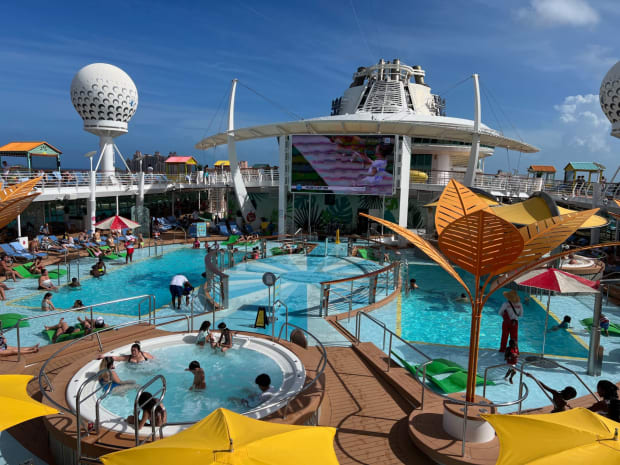Cruise ships rely in part on governments permitting them to dock and have passengers disembark. As Royal Caribbean (RCL), Carnival Cruise Line (CCL), and Norwegian Cruise Line (NCLH) have restarted operations after the pandemic closure, finding ports of call has been a problem.
The three companies have seen planned destinations either remain closed to cruise ships or not accept them at the last minute due to onboard Covid-omicron-driven outbreaks. That's a problem as U.S. law actually requires cruise ships leaving from an American port to make a stop.
Royal Caribbean, Carnival, and Norwegian all own private islands that, while they fall under local government regulation, aren't generally subject to closures. For ships sailing from Florida, these islands are stops that meet the U.S. law requirement and that passengers generally enjoy.
That's especially true for Royal Caribbean, which has not only Coco Cay -- a Caribbean island with a water park, a giant pool, and a beach club -- but also its private section of Labadee, Haiti.
Unfortunately, Labadee has been off-limits for the company since it returned to sailing from U.S. ports in July due to political unrest in Haiti.
Now, however, Royal Caribbean has returned to Labadee, and that gives the company another fan-favorite destination at which it can dock its ships. And that offers the company a meaningful edge over Carnival and Norwegian.

Image source: Daniel Kline.
Royal Caribbean Returns to Labadee
For weeks, signs that Royal Caribbean planned to return to Haiti have been popping up. The company had run ads looking for staff to work on the "island" and fans of the brand noticed that a late-January sailing of Harmony of the Seas had not canceled its stop at the island.
Previously, passengers on ships scheduled to stop at Labadee got emails from the cruise line alerting them to the stop changing (usually to either Coco Cay, a sea day, or Nassau, a stop many experienced cruisers generally don't consider a positive).
Harmony of the Seas did in fact return to Labadee on Jan. 27, marking Royal Caribbean's return to its private destination.
French, of course, is spoken in Haiti, but the tweet above translates to:
"Cruise ships are back in Labadee. After a long absence due to Covid. Good news for the community of Labadee, for Cap-Haitien, the North, and Haiti."
It's also good news for Royal Caribbean, its customers and its shareholders.
Why Is Labadee Important to Royal Caribbean?
Royal Caribbean has invested in making its private "islands" into destinations that improve on what Carnival and Norwegian offer.
The Carnival island in the Caribbean, Half Moon Cay, offers a beach and not much else. Coco Cay has a for-fee water park and beach club, as well as a massive pool.
Labadee has not been developed as much as Coco Cay, but it does offer some experiences beyond the beach. The private destination has a self-controlled roller coaster-like experience, a water slide, and a water park with giant inflatables.
The return of Labadee gives Royal Caribbean a second desirable destination for its cruise ships. That's valuable when it's possible that any country decides not to allow cruise ships to dock due to the current state of the pandemic or to what's happening on a specific ship.
Coco Cay can accommodate two Royal Caribbean ships each day, giving the company 14 available slots at the island. Labadee can accommodate two ships as well, which doubles the company's private destination slots available for ships sailing from Florida.
That gives Royal Caribbean the ability to plan more ships stopping at Labadee and lets the cruise line leave some slots open in Haiti if it needs a backup destination should another stop get canceled.
Having two private destinations won't stop customers from being upset when a planned stop gets canceled. In some cases, however, passengers will prefer a Coco Cay or Labadee visit.
So, while Royal Caribbean won't keep everyone happy, the reopening of Labadee means that more customers will be happy and that's good for repeat business.







